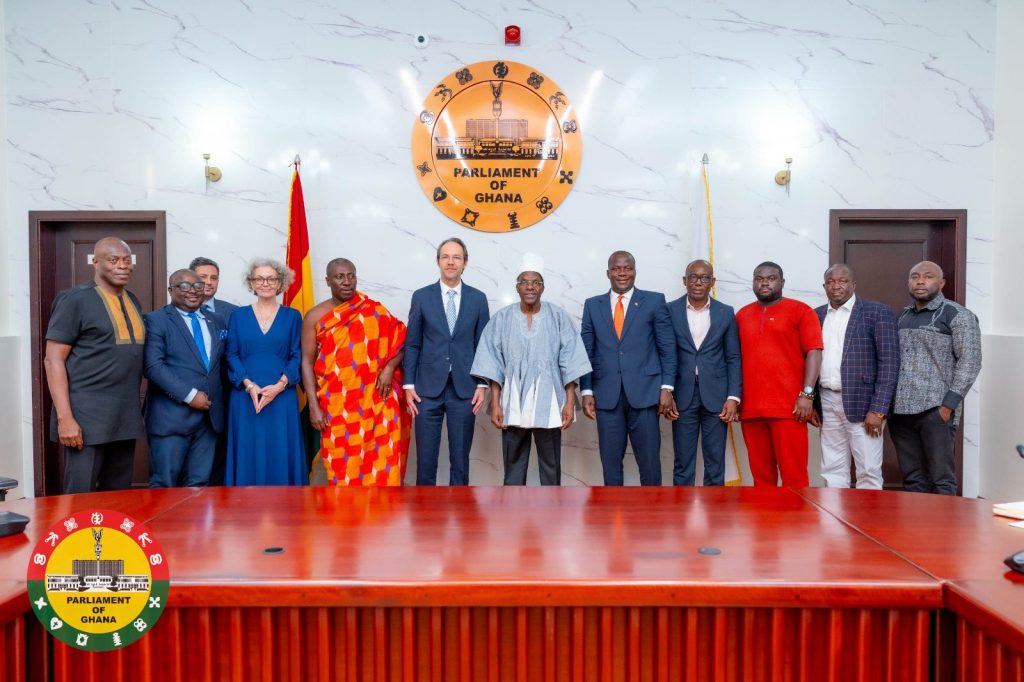
The Speaker of Parliament, Alban Sumana Kingsford Bagbin, has expressed profound gratitude to the British High Commission for presenting a copy of the historic Bond of 1844 to Ghana’s Parliament. This landmark treaty marked the beginning of British legal and administrative rule in what became the Gold Coast.
The Bond, signed on 6 March 1844 between eight Fante chiefs and representatives of the British government, was a turning point in Ghana’s colonial history. While the Fante chiefs regarded it as a military and defence pact against the Asante Kingdom, the British interpreted it as an instrument granting them judicial authority and the right to enforce British law in the coastal territories.

The agreement thus laid the groundwork for the establishment of the Gold Coast colony and, ultimately, Ghana’s independence in 1957.
Mr Bagbin made the acknowledgement when the newly appointed British High Commissioner to Ghana, Dr Christian Rogg, paid a courtesy call on him at Parliament House in Accra to officially introduce himself.
The Speaker extended his appreciation to His Majesty King Charles III and the British Prime Minister, Sir Keir Starmer, for what he described as “a brilliant display of diplomacy” during the recent state visit of United States President Donald Trump to the United Kingdom.

“You made me feel proud to be a member of the Commonwealth,” Mr Bagbin said, commending the cordial relations between Ghana and the United Kingdom.
Dr Rogg, for his part, reaffirmed his commitment to strengthening and deepening diplomatic relations between the two countries.
He highlighted the High Commission’s ongoing engagements with Ghana’s Parliament, including collaboration on economic growth, security, and capacity-building for Members of Parliament.
Also present to welcome the delegation were the Minority Leader, Alexander Kwamena Afenyo-Markin; the Ranking Member of the Foreign Affairs Committee, Samuel Abu Jinapor; and the Deputy Clerk to Parliament, Mr Camilo Pwamang.
For nearly three centuries, European interests along the coast of present-day Ghana were primarily commercial. The British, who had been active there since 1555, focused primarily on trade, including the slave trade.
The emergence of the Fante and Asante states shaped the dynamics of this trade, with the Fantes controlling access to the coast and the Asantes dominating the supply of gold and slaves from the hinterlands.
As tensions grew between the two powerful groups, the British became increasingly concerned about the impact of Asante expansion on their trading interests. By the early 19th century, this concern led to a series of British military and diplomatic interventions, culminating in the appointment of Sir Charles MacCarthy as governor of the Gold Coast settlements in 1821.
After years of warfare and shifting alliances, the arrival of Governor George Maclean in 1830 ushered in a period of relative peace and expanded trade with his diplomatic efforts culminating in the signing of the Bond of 1844 at Fomena-Adansi.
The agreement bound the signatory chiefs to British judicial authority and abolished local customs deemed “repugnant to natural justice, equity and good conscience.”
In effect, it transferred judicial power from African traditional courts to the British, laying the foundation for the colonial administration that would follow.
The Bond of 1844 thus stands as a cornerstone of Ghana’s colonial history, a document that both symbolises the beginning of British rule and underscores the long, complex journey towards the nation’s eventual independence on 6 March 1957, precisely 113 years later.
The post British High Commission gives Ghana’s Parliament copy of Bond of 1844 appeared first on The Herald ghana.


